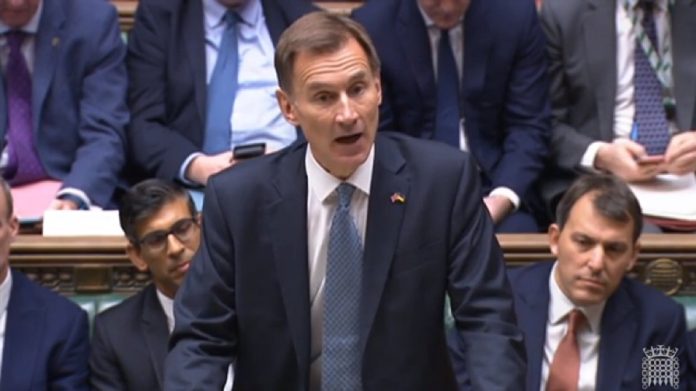More people will be paying the tip rate of tax as the Chancellor has reduced the threshold at which the top rate of income tax is paid from £150,000 to £125,140 in his autumn statement
It means those earning over £150,000 will pay £1,200 more a year in tax.
He increased the windfall tax on oil and gas giants from 25% to 35% and imposed a 45% levy on electricity generators to raise an estimated £14 billion next year
The energy price guarantee will rise by £500 to £3,000 but there will a new package of support for poorest
£900 for those on means tested benefits,£300 for pensioner households and £150 for those on disability benefit
Benefits will go up in line with inflation – so 10.1% – in April and the Chancellot confirmed
He also confirmed that the Government will keep pensions triple lock meaning pensions will also go up in line with inflation from April.
Jeremy Hunt promised that his autumn statement will lead to a “shallower downturn” in the UK’s finances
Hunt said that he will be ‘honest about the challenges and fair about the solutions’ and added that the Office of Budget Responsibility has confirmed “global factors” are the “primary cause” of inflation,
He said that the Government’s plans will lead to a shallower downturn, lower energy bills, higher growth, a stronger NHS and education system and will keep the rise in unemployment down – saving 70,000 jobs.
The Office for Budget Responsibility forecasts the UK’s inflation rate to be 9.1% this year and 7.4% next year
He told MP’s that the government must make “sacrifices” in the manner of ordinary households
Under half the consolidation comes from tax rises and just over half from spending restraint
Amongst other measures announced the Stano Duty cut announced by Liz Truss Stamp duty will be reversed in 2025, after the election
While Allowances on unearned income will be reformed with the dividend allowance will be cut from £2,000 to £1,000 next year and then to £500 from April 2024.
Liz Truss’ Truss’s commitment to increase defence spending to 3% of national income is now under review, subject to detailed examination in an update of the “Integrated Review” and the country will not return to 0.7% foreign aid target for the time being
Electric vehicles will no longer be exempt from Vehicle Excise Duty from April 2025
Two new fiscal rules have been announced.The first is that underlying debt must fall as a percentage of GDP by the fifth year of a rolling five-year period.”
“The second, that public sector borrowing, over the same period, must be below 3% of GDP.”
Increases in public spending will be limited to 1% from 2025 to 2028 – a big fall from previous plans to increase public spending by 3.7%
As far as the NHS is concerned,the Chancellor has committed to a workforce plan and confirmed that the 2-year delay in social care cap (subsidy for inheritances), putting money directly into local council care instead
The Chancellor said he will increase the NHS budget by an extra £3.3 billion in each of the next two years
The former Labour Health Secretary Patricia Hewitt is to advise on NHS efficiency
The budget for schools will be increasing by £2.3bn next year & £2.3bn the year after – taking the core schools budget to a total of £58.8bn.
All Government departments will have to live within envelope of the March Spending Review, when inflation was at three per cent so there will be real terms cuts across board a depts have to “make efficiencies to deal with inflationary pressures in next two years”
More than 600,000 people on Universal Credit to be asked to meet ‘work coach’
The Work and Pensions Secretary Mel Stride will review “issues holding back workforce participation”, which will conclude early in the new year.
Hunt said he would add an extra £6 billion of investment in energy efficiency from 2025 to help meet a new ambition of reducing energy consumption from buildings and industry by 15% by 2030






